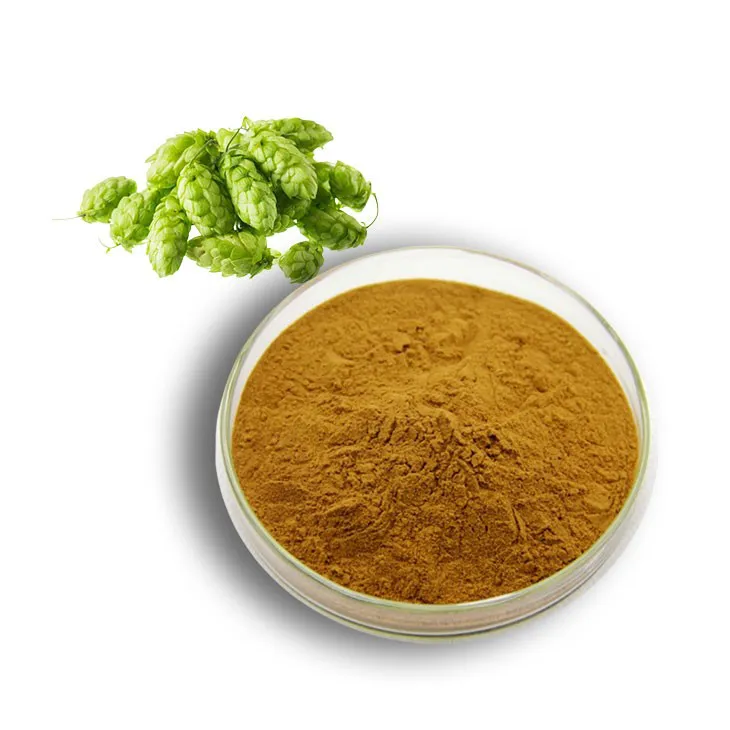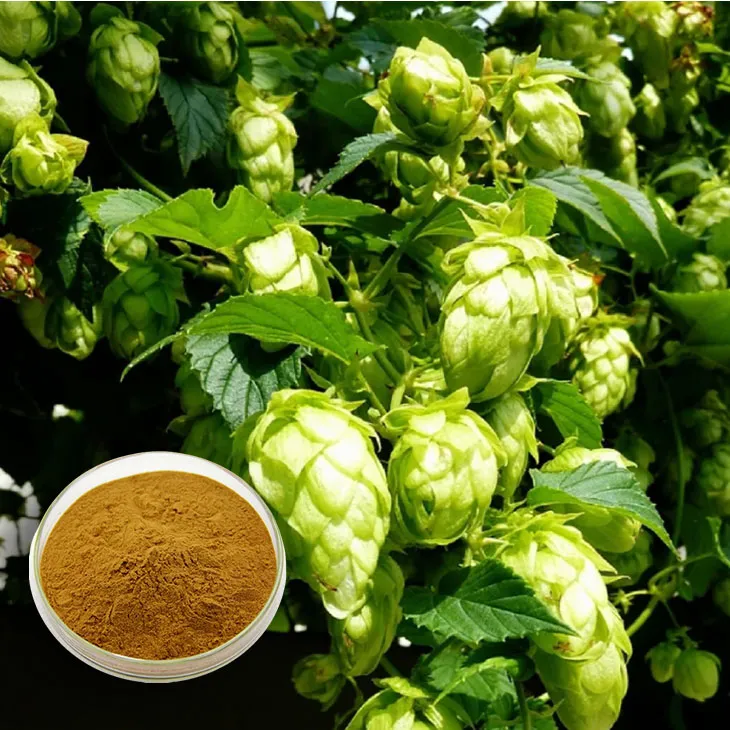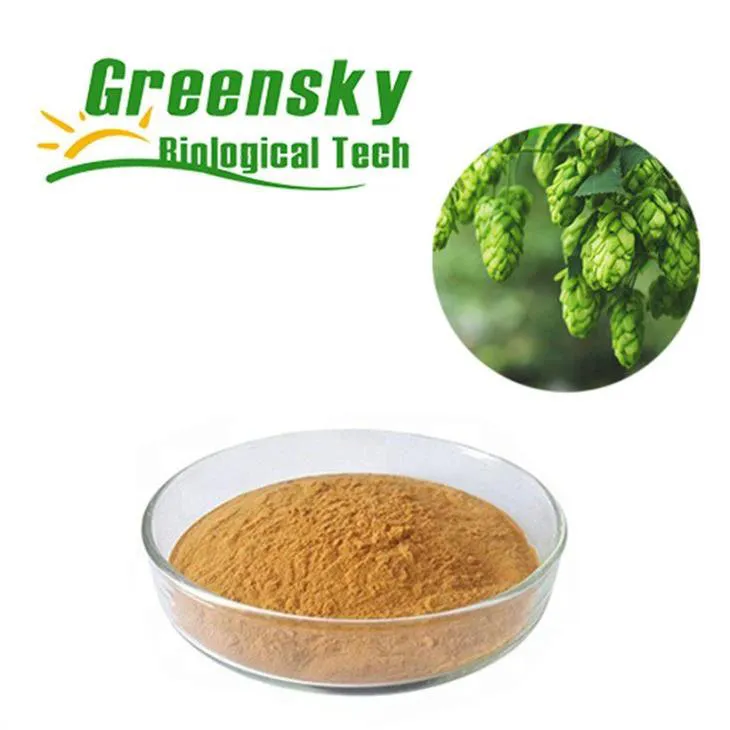- 0086-571-85302990
- sales@greenskybio.com
The Best Sources of Natural Hops Extract.
2024-11-30

Introduction
Natural hop extracts play a crucial role in the brewing industry, contributing to the unique flavor, aroma, and bitterness of beer. Understanding the best sources of these extracts is essential for both beer enthusiasts and the brewing community. This article will explore the traditional and emerging regions of hop production, as well as the significance of organic farming in obtaining pure and potent hop extracts.

Traditional Hop - Growing Regions
The Pacific Northwest, United States
The Pacific Northwest of the United States is renowned for its hop production. The region, which includes states like Washington and Oregon, benefits from a combination of factors that make it an ideal location for growing hops.
Climate: The climate in the Pacific Northwest is characterized by warm, dry summers and cool, wet winters. The long, sunny days during the summer months are perfect for hop growth. Hops require a significant amount of sunlight to develop their characteristic flavors and aromas. The dry summers also help to prevent diseases that can be prevalent in more humid conditions. For example, powdery mildew can be a significant problem for hop plants, but the relatively dry climate in this region helps to keep it at bay.
Soil Conditions: The soil in the Pacific Northwest is rich and fertile. It contains a good balance of nutrients such as nitrogen, phosphorus, and potassium, which are essential for healthy hop growth. Additionally, the soil has excellent drainage properties. Hops do not tolerate waterlogged conditions well, as it can lead to root rot. The well - drained soil in this region ensures that the roots of the hop plants can access oxygen and nutrients effectively.
Some of the most well - known hop varieties grown in the Pacific Northwest include Cascade, Centennial, and Chinook. These hops are highly prized for their citrusy, floral, and piney aromas, respectively, and are widely used in American - style ales and IPAs.
Bavaria, Germany
Bavaria in Germany has a long - standing tradition of hop growing and is another significant source of high - quality natural hop extracts.
Climate: Bavaria has a continental climate with distinct seasons. The summers are relatively warm, but not as hot as in some other hop - growing regions. This moderate temperature allows for a slow and steady growth of hop plants, which can contribute to more complex flavor development. The winters are cold, which helps to give the hops a natural dormancy period. This dormancy is important for the plant's overall health and the development of its flavor compounds.
Soil Conditions: The soil in Bavaria is often loamy and well - structured. It has a good water - holding capacity while still providing adequate drainage. The soil also contains a diverse range of minerals that are beneficial for hop growth. German hops are known for their noble characteristics, such as a mild bitterness and a pleasant, spicy - herbal aroma. Varieties like Hallertau Mittelfrüh and Tettnang are famous worldwide for their use in traditional German lagers and pilsners.

Emerging Hop - Growing Regions
In recent years, there have been emerging regions in hop production that are starting to gain recognition for their unique hop varieties and qualities.
New Zealand
New Zealand has emerged as an exciting new source of natural hop extracts.
Climate: New Zealand has a diverse climate due to its long and narrow geographical shape. In the hop - growing regions, there are long daylight hours during the growing season, which promotes vigorous growth. The relatively mild climate, with cool nights and warm days, also helps to develop unique flavors in the hops. For example, New Zealand hops are often associated with tropical and fruity flavors such as passionfruit, mango, and gooseberry.
Soil Conditions: The soil in New Zealand's hop - growing areas varies, but in general, it is well - suited to hop production. Some areas have volcanic soils that are rich in minerals, providing an excellent nutrient base for the plants. New Zealand - grown hops like Nelson Sauvin and Motueka are becoming increasingly popular in the craft beer industry, especially in styles that require a distinct and intense fruity aroma.
Australia
Australia is also making its mark in the hop - growing world.
Climate: Australia has a wide range of climates, but in the hop - growing regions, there are warm and dry conditions. These conditions can be challenging, but with proper irrigation and management, they can produce high - quality hops. The long hours of sunlight contribute to the development of strong flavors. Australian hops are known for their bold and assertive characteristics, such as a strong citrus and resinous flavor.
Soil Conditions: The soil in Australian hop - growing regions can be sandy or loamy. It often requires additional fertilization to ensure the hops receive all the necessary nutrients. However, with the right agricultural practices, Australian hops like Galaxy are highly sought - after for their intense and unique flavor profiles, which are used in a variety of modern and experimental beer styles.

The Role of Organic Farming in Hop Production
Benefits of Organic Farming for Hops: Organic farming has become increasingly important in the production of pure and potent hop extracts.
- Purity of Extracts: Organic farming avoids the use of synthetic pesticides and fertilizers. This results in a more natural product with fewer chemical residues. For beer enthusiasts who are concerned about the purity of the ingredients in their beer, organic hops are an attractive option. The lack of chemical contaminants can also lead to a cleaner and more refined flavor in the final beer product.
- Soil Health: Organic farming practices focus on building and maintaining healthy soil. This includes techniques such as crop rotation, cover cropping, and the use of organic matter amendments. By improving soil health, the hop plants can access a wider range of nutrients, which can contribute to more complex and nuanced flavors in the hops. For example, a healthy soil microbiome can help break down organic matter and release nutrients in a more sustainable way compared to chemical fertilizers.
- Environmental Sustainability: Organic hop farming is more environmentally friendly. It reduces the impact on water quality by avoiding the runoff of synthetic chemicals. It also promotes biodiversity by creating a more natural habitat for insects, birds, and other wildlife. This can have a positive impact on the overall ecosystem in which the hop farms are located.
However, organic hop farming also presents some challenges.
- Pest and Disease Management: Without the use of synthetic pesticides, organic hop farmers need to rely on alternative methods to control pests and diseases. This can include biological control methods such as the release of beneficial insects, the use of natural predators, and the application of botanical pesticides. These methods require more knowledge and careful monitoring to be effective.
- Yield Variability: Organic hop farms may experience more variability in yields compared to conventional farms. This is due to factors such as the reliance on natural soil fertility and the effectiveness of organic pest and disease control methods. However, with proper management and experience, organic hop farmers can still produce high - quality hops in sufficient quantities.
Conclusion
The best sources of natural hop extracts are diverse, ranging from traditional regions like the Pacific Northwest in the United States and Bavaria in Germany to emerging regions such as New Zealand and Australia. Each region offers unique climate and soil conditions that contribute to the development of distinct hop flavors and aromas. Additionally, the role of organic farming in hop production is becoming increasingly important, offering benefits such as purer extracts, improved soil health, and environmental sustainability, despite some challenges. Understanding these sources and production methods is essential for the brewing industry and beer enthusiasts alike, as it allows for the creation of a wide variety of high - quality beers with unique flavor profiles.
FAQ:
What are the traditional regions for high - quality natural hop extract production?
The traditional regions for high - quality natural hop extract production include the Pacific Northwest in the United States and Bavaria in Germany. These regions have unique climates and soil conditions which are favorable for excellent hop production.
Why are the climates and soil conditions in traditional regions important for hop production?
The climates and soil conditions in traditional regions are crucial for hop production. For example, in the Pacific Northwest of the United States and Bavaria in Germany, the specific climates offer the right amount of sunlight, temperature, and rainfall. The soil in these areas contains the necessary nutrients, which together contribute to the growth of high - quality hops that are ideal for making natural hop extracts.
What are the emerging regions for natural hop extract production?
The article doesn't specifically name the emerging regions for natural hop extract production. However, it does mention that there are emerging regions in addition to the traditional ones. These emerging regions are also important in the context of natural hop extract production.
How does organic farming contribute to the production of pure and potent hop extracts?
Organic farming contributes to the production of pure and potent hop extracts in several ways. Organic farming methods avoid the use of synthetic pesticides and fertilizers. This helps in maintaining the natural purity of the hops. The natural growth environment created by organic farming can enhance the potency of the hops, resulting in high - quality natural hop extracts.
Why is the study of natural hop extract sources important for the brewing industry?
The study of natural hop extract sources is important for the brewing industry because the quality of hops directly affects the flavor, aroma, and overall quality of the beer. By understanding the best sources of natural hop extracts, breweries can ensure they are using high - quality ingredients, which can lead to better - tasting beer and a competitive edge in the market.
Related literature
- The World of Hops: A Comprehensive Guide to Hop Varieties and Their Origins"
- "Hop Production: Traditional and Modern Techniques"
- "Organic Farming and the Future of Hop Extracts"
- ▶ Hesperidin
- ▶ citrus bioflavonoids
- ▶ plant extract
- ▶ lycopene
- ▶ Diosmin
- ▶ Grape seed extract
- ▶ Sea buckthorn Juice Powder
- ▶ Beetroot powder
- ▶ Hops Extract
- ▶ Artichoke Extract
- ▶ Reishi mushroom extract
- ▶ Astaxanthin
- ▶ Green Tea Extract
- ▶ Curcumin Extract
- ▶ Horse Chestnut Extract
- ▶ Other Problems
- ▶ Boswellia Serrata Extract
- ▶ Resveratrol Extract
- ▶ Marigold Extract
- ▶ Grape Leaf Extract
- ▶ blog3
- ▶ blog4
-
Nature's Bounty Dandelion Root Extract.
2024-11-30
-
The best barberry extract in nature.
2024-11-30
-
Mangosteen extract powder
2024-11-30
-
Troxerutin
2024-11-30
-
Lycopene
2024-11-30
-
Tamarind extract powder
2024-11-30
-
Licorice Root Extract Powder
2024-11-30
-
Garcinia Cambogia Extract
2024-11-30
-
Fenugreek Extract Powder
2024-11-30
-
Beetroot Powder
2024-11-30
-
Scutellaria Extract
2024-11-30
-
Peppermint Oil
2024-11-30





















